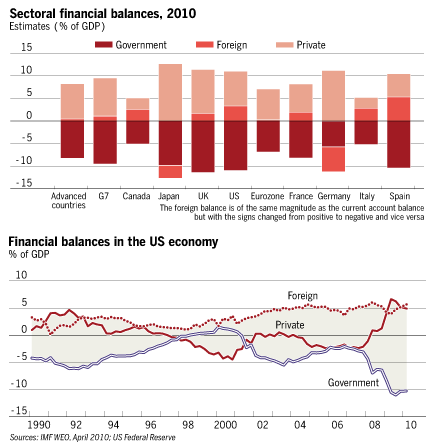In Why plans for early fiscal tightening carry global risks, Martin Wolf of the Financial Times demonstrates yet again why he is the most savvy columnist writing on that side of the pond.
He looks at the foolishness of the Austerians, the name Mark Thoma has given to the newly converted deficit chickenhawks.
Wolf:
“Yet again, we hear the cry of the old economic religion: repent before it is too late; the wages of fiscal sin is death. But is it already time to retrench? I doubt it. At least, we must recognise the risks: delayed retrenchment poses the danger of inflation and even default; premature retrenchment threatens recession and even deflation, as I argued last week. Having barely survived the biggest financial meltdown in history, we need to appreciate that these downside risks are serious . . .
Let us look at where we now are, courtesy of the financial balance approach of the late Wynne Godley. This forces us to examine how the private sector is behaving. In 2010, according to the International Monetary Fund’s latest forecasts, the private sectors of every large high-income country will run a huge excess of income over spending. This is forecast at 7.8 per cent of gross domestic product for these countries as a group, at 12.6 per cent for Japan, at 9.7 per cent for the UK, at 7.7 per cent for the US and at 6.8 per cent for the eurozone. What we are seeing, in short, is an epidemic of private sector frugality – just as many economic doctors recommended.
Yet such thrift entails either current account surpluses or fiscal deficits. Of these countries, only Germany and Japan have current account surpluses. The rest are capital importers. These countries will duly run fiscal deficits that are bigger than their private surpluses. We have, as the hysterics note, a tide of fiscal red ink. Which came first – private retrenchment or fiscal deficits? The answer is: the former. In the case of the US, the huge shift in the private balance between the fourth quarter of 2007 and the second quarter of 2009, from a deficit of 2.2 per cent of GDP to a surplus of 6.6 per cent, coincided with the financial crisis. The fact that aggregate demand and long-term interest rates tumbled at the same time shows that the collapse in private spending “crowded in” the fiscal deficits. Wild private behaviour drove the wild public behaviour.
Yet it would now be particularly damaging for fiscal austerity to overcome the European economy and so force beggar-my-neighbour outcomes on the hapless US. As Fred Bergsten of the Peterson Institute for International Economics in Washington noted in the FT last week, such policies could be very dangerous. Thus, far from being stabilising, premature fiscal retrenchment threatens destabilisation of the world economy. In this case, a decision to turn the eurozone into a huge Germany would – and should – be seen as an act of mercantilist warfare upon the US. How long would the latter put up with the hypocrisy of surplus countries that blame borrowers for the deficits their own surpluses make inevitable? Not much longer, would be my guess, at least now that the US government has become the world’s borrower of last resort.
I have to ping Thoma to ask if its a mere coincidence that Austerians sounds awfully similar to Austrians . . .
>
>
Source:
Why plans for early fiscal tightening carry global risks
Martin Wolf
FT, June 15 2010 22:41
http://www.ft.com/cms/s/0/fc8d1dd4-78b6-11df-a312-00144feabdc0,s01=1.html



What's been said:
Discussions found on the web: